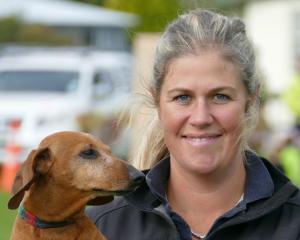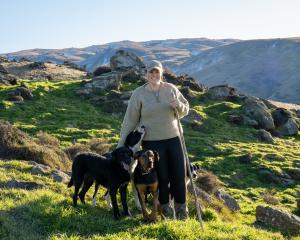
Lower-order sharemilker Geoff Colson milks nearly 1200 cows across two farms at Papakaio.
The farms are the 212ha-effective Riverstone and 137ha-effective Miraka, owned by father and son Neil and Mike Smith.
Mr Colson moved from farming in Northland to Papakaio to work for the Smiths about 11 years ago, saying he got sick of drought.
After three years in North Otago, he and his partner Emma moved further south "to go and play in the mud in Southland — I wanted to tick that off the bucket list".
They enjoyed working in Mokoreta in the West Catlins for three years and learnt a lot about farming and themselves. It was a beautiful spot but also very wet yet it could also get very dry.
After the farm in the Catlins sold, they returned to work for the Smiths.
Developments on the farm since they had returned included the installation of pivot irrigation and cows wearing Halter smart collars.
The collars were put on the cows in September last year.
Calving was about halfway through and it had been one of the most stress-free calvings he had experienced during his more than 20-year farming career, Mr Colson said.
The collars had allowed them "to not miss a beat", despite being two staff short.
"It takes all the guesswork out of it."
The collars were expensive but were worth it because they reduced labour costs and the cows were happier.
Another development when they were away was the herd being artificially inseminated with unproven semen from young bulls in the CRV Ambreed programme.
The straws of the semen were cheaper than straws in a sire-proving scheme.
This season, they had been DNA testing the heifer calves from 2-year-old cows, which accounted for about 30% of the herd.
In a couple of years, the whole herd would be DNA-tested.
The DNA data showed the potential performance of a calf as a 2-year-old cow and helped him make selection decisions.
Most years they had a surplus of heifer calves, which were sold.
"They are still good animals but the other ones are better."
Before DNA testing, it could take up to four years to be able to rate the performance of a cow.
On his return to farm in North Otago, he admitted he was sceptical when he heard the Smiths were using unproven semen and DNA testing.
He had since been convinced because the testing had allowed him to create a more productive herd to run on a low-cost, all-grass farm system.
"It is a win-win."
Before he left for the Catlins, the best-performing cows in the herd were aged 6 and 7.
Now the best-performing cows were aged 4, which were the first crops of calves since switching to unproven semen.
"It shows those genetics do work."
CRV sales consultant Deborah Adair-Dagg said an increasing number of Otago dairy farmers were DNA testing their calves to help them make better breeding decisions.
"With DNA testing, farmers can confidently select the best replacement animals, allocate sexed semen to genetically superior cows and increase the rate of genetic gain in their herd. DNA also makes calving much easier by matching calves back to dams. There is no need to mother calves in the paddocks, which saves time and money."
The same ear tissue from a calf’s DNA test could be used for genomic testing, which was a more accurate method of predicting the performance of an animal.
By determining which calves were likely to be better producers, farmers could focus time, money and staffing resource on growing those animals which boosted production numbers and increased the value of their herd.
As dairy farmers grappled with rising costs of production, many might see DNA and genomic testing as luxuries they could not afford but the investment paid for itself in the short term and could significantly boost profits over time, she said.
"It costs about $1800 to raise a heifer into the herd, so you only want to spend that money on animals that have the traits your business needs."















